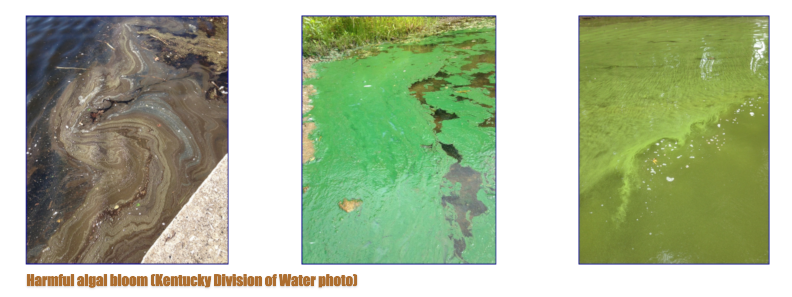Harmful algal bloom confirmed on Herrington Lake, people urged to limit exposure where it’s present

Kentucky Health News
The Kentucky Energy and Environment Cabinet is warning people to limit exposure to the water in certain areas of Herrington Lake that are experiencing a harmful algal bloom.
“A harmful algal bloom, or HAB, has been confirmed at Paradise Camp on Herrington Lake. A second area, near Tanyard Branch, also known as Redgate, is also experiencing bloom activity,” the warning says. “The public is advised to limit exposure to the water in these locations and to remain aware that other areas on Herrington Lake may also be experiencing a HAB bloom.”
The warning, issued on Thursday, June 19, states that at this time, drinking water supplied from Herrington Lake is not affected but is being closely monitored. Herrington Lake is a 2,335-acre lake located in Boyle, Mercer and Garrard counties.
Harmful algal blooms happen when toxin-producing cyanobacteria, also known as blue-green algae, grow excessively in a body of water, usually because of runoff from heavy rains and warm temperatures.
“They may appear as slicks of opaque, bright-green paint, but closer inspection often reveals a grainy, sawdust-like appearance,” according to the news release.
State officials ask people who think they’ve seen a harmful algal bloom to report it to the Division of Water by calling 502-564-3410 or emailing water@ky.gov. After hours and on weekends, report the sighting to the 24-hour hotline at 502-564-2380 or 1-800-928-2380.
The state offers tips to avoid exposure to harmful algal blooms:
- Avoid direct contact with affected water that has a visible bloom, unusual color or algal scum, including swimming, wading, paddling, diving and water skiing.
- People who are prone to respiratory allergies or asthma should avoid areas with HABs. Children may be particularly at risk.
- If contact has been made with water containing blue-green algae, wash off with fresh water. In some cases, skin irritation will appear after prolonged exposure. If symptoms persist, consult your health care provider.
- If fishing in affected waters, fish fillets (not internal organs) may be consumed after the fillets have been rinsed in clean, potable water.
- Prevent pets and livestock from coming into contact with water where HABs are apparent.